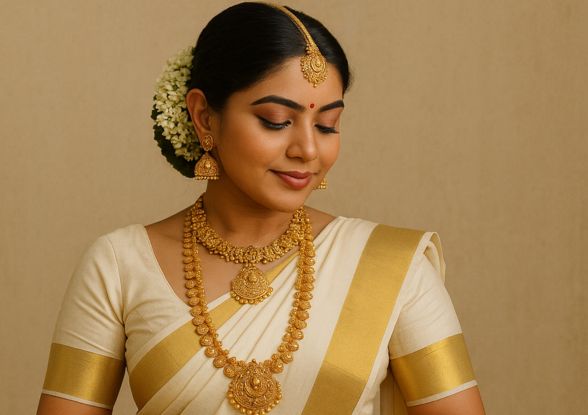The traditions and importance of gold jewellery on Vishu
If you are a Malayali, the golden hues of ‘Kani Konna’ must be the first thought that comes to mind when you think about Vishu. First of all, Rajakumari Jewellery in Kerala wishes you a very auspicious Vishu. The traditional Malayali New Year celebration, known as Vishu, celebrates family and traditions and represents prosperity. The word Vishu originates from the Sanskrit word Visuvam, which translates to equal, implying its association with the vernal equinox.
Generally celebrated as the astronomical new year in Kerala and in many other parts of India, Vishu is considered a spring harvest festival, and in mythology, it is the same day on which Lord Krishna defeated the demon king Narakasura. Vishu marks new beginnings and a beautiful start to the year ahead of us, and one of the core aspects of this spring festival is giving, sharing, and inviting good fortune and prosperity.
Men and women traditionally wear new clothes known as ‘Vishu kodi’ and traditional gold jewellery to celebrate the new year, and Vishu is a time for gift-giving as well. ‘Vishu kaineettam’ is a long-standing tradition of Vishu in which the elder members of the family give gifts or money to the younger members. In this article, we will look into the traditional pieces of gold jewellery customary to Vishu, but first, let’s take a quick run through the traditions of Vishu, in case you forgot!
The symbolic traditions of Vishu
As we have discussed before, Vishu has a strong association with Narakasura’s death at the hands of Lord Krishna. This is why Krishna is the deity mainly worshipped on the occasion of Vishu, but let’s talk about the most significant tradition of Vishu, the ‘Vishukani’.
‘Vishukani’ literally translates to ‘the sight first seen on the day of ‘Vishu’, and the tradition of preparing a Vishukani the night before Vishu to view first in the morning originates from the belief that the year ahead will be a good one if we view auspicious offerings of Vishukani on the new year morning. A typical Vishukani consists of a Krishna idol, the traditional Kerala brass lamp known as ‘nilavilakku’, the mirror known as ‘aranmula kannadi’, cut open coconut, rice, coins, Kasavu mundu (traditional Kerala white clothing with golden borders), eye kohl, sweet snacks such as Ada and Unniyappam, yellow cucumber (Vellari), seasonal fruits such as jackfruit and mangoes, banana, the Kanikonna flowers, and gold jewellery.
The Vishu Day celebrations start with the viewing of Vishukani. Other Vishu traditions include the previously discussed gift-giving called Vishu Kaineettam and Sadhya, the mouth-watering feast accompanying most traditional celebrations and festivals in Kerala. Another favourite element of Vishu, especially among children, is the firecrackers. Families come together to celebrate the beginning of a new year, and gold jewellery is a staple during Vishu in Malayali families as it symbolises prosperity and good fortune.
Traditional gold jewellery for Vishu
Kerala is known all over the world for many things, and one of the most significant parts of our heritage is our mesmerising gold jewellery designs. These centuries-old designs still prevail and are an important part of the jewellery collections of Malayali women to this day. One of the most significant characteristics of traditional Kerala gold jewellery is its intricacy; each piece is a story and represents regal elegance. Now let's look into some of the traditional Kerala gold jewellery pieces commonly worn during Vishu.
The Kasu Mala
Kasu mala is a traditional piece of gold jewellery that perfectly captures the heritage and culture of Kerala. Kasu mala literally translates to a chain of coins or necklace or coins, and this perfectly describes the essence of Kasu mala because it's a long necklace with a string of thin, small coins on it. These coins generally have the goddess Lakshmi stamped or embossed on them and are considered to bring wealth and prosperity. Kasu mala’s design is centuries old and has been passed down through generations, which is why it has a significant part in the Kerala bridal jewellery collection too.
The Nagapada thali
The Nagapada thali is another traditional Kerala jewellery design adored by Malayali women. The Malayalam word ‘Nagapadam’ translates to snake hood, and just as the name suggests, this is a necklace with snake head motifs. The gold Nagapada thali is most often adorned with green semi-precious stones or emeralds, and sometimes rubies, on the snake-hood-shaped motifs.
This is a piece of jewellery that holds great religious and cultural significance and is believed to bring blessings and protection to the wearer. The snake gods called Naga’s have been worshipped in Kerala for as long as anyone can remember; in most temples, you can find a part called 'kavu', a tiny forest dedicated to these gods. The contrast of gold and green in the Nagapada thali goes exceptionally well with the white and gold Kerala saree too, making it a staple item in any Malayali women’s jewellery box.
Bangles
When it comes to traditional Kerala gold jewellery, bangles are an inevitable item. Bangles are a daily wear item among Malayali women, and for occasions like weddings, multiple designs of bangles are adorned together on hands. From uniformly thick, sturdy bracelets to incredibly intricate designs, Kerala traditional bangles are cherished for their elegance. Karavala, Ottavala, Veera sringala, and Lakshmi vala are among the most popular bangle designs on traditional occasions like Vishu.
A golden start
Manga Mala, Mullamottu Mala, Lakshmi Mala, Mukkutti, Jimikki—the list of traditional Kerala jewellery is almost never-ending, and Vishu is the best time to explore and update your jewellery collections with such traditional pieces or gift your loved ones with a special golden memory. If you are ready for a golden start this year, buy from the best gold jewellery in Kerala! Rajakumari
Jewellers has been one of the most exclusive jewellery in Kerala for more than two decades, thanks to our exceptional service and extensive collection of traditional, fusion, and modern jewellery. So if you are ready to embrace the elegance of tradition and a golden start on this Vishu, visit Rajakumari.
.jpg)
.jpg)
.jpg)


